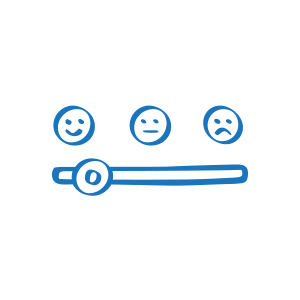The Continuum
It’s important to think of our mental health on a continuum, rather than thinking of people as either mentally well or mentally ill.
We are all on the continuum and we all move up or down based on a number of factors, which can include: our genetic make-up and upbringing, our life circumstances, and the stresses we’re under.
- Healthy
- Reacting
- Injured
- Ill
Healthy
Signs & Indicators
- Normal mood fluctuations
- Calm/confident
- Good sense of humour
- Taking things in stride
- Can concentrate/focus
- Consistent performance
- Normal sleep patterns
- Energetic, physically well, stable weight
- Physically and socially active
- Performing well
- Limited alcohol consumption, no binge drinking
- Limited/no addictive behaviours
- No trouble/impact due to substance abuse
Actions to Take
- Focus on task at hand
- Break problems into manageable tasks
- Controlled, deep breathing
- Nurture a support system
Reacting
Signs & Indicators
- Nervousness, irritability
- Sadness, overwhelmed
- Displaced sarcasm
- Distracted, loss of focus
- Intrusive thoughts
- Trouble sleeping, low energy
- Changes in eating patterns, some weight gain/loss
- Decreased social activity
- Procrastination
- Regular to frequent alcohol consumption, limited binge drinking
- Some to regular addictive behaviours
- Limited to some trouble/impact due to substance use
Actions to Take
- Recognize limits, take breaks
- Get enough rest, food, exercise
- Reduce barriers to help-seeking
- Identify and resolve problems early
- Example of personal accountability
Injured
Signs & Indicators
- Anxiety, anger, pervasive sadness, hopelessness
- Negative attitude
- Recurrent intrusive thoughts/images
- Difficulty concentrating
- Restless, disturbed sleep
- Increased fatigue, aches and pain
- Fluctuations in weight
- Avoidance, tardiness, decreased performance
- Frequent alcohol consumption, binge drinking
- Struggle to control addictive behaviours
- Increase trouble/impact due to substance use
Actions to Take
- Talk to someone, ask for help
- Tune into own signs of distress
- Make self-care a priority
- Get help sooner, not later
- Maintain social contact, don't withdraw
Ill
Signs & Indicators
- Excessive anxiety, panic attacks, easily enraged, aggressive
- Depressed mode, numb
- Non-compliant
- Cannot concentrate, loss of cognitive ability
- Suicidal thoughts/intent
- Cannot fall asleep/stay asleep
- Constant fatique, illness
- Extreme weight fluctuations
- Withdrawal, absenteeism
- Can't perform duties
- Regular to frequent binge drinking
- Addiction
- Significant trouble/impact due to substance use
Actions to Take
- Follow care recommendations
- Seek consultation as needed
- Respect confidentiality
- Know resources and how to access them
You may have a mental illness and feel great sometimes. You may not have a mental illness, but feel bad at times.
Mood fluctuations, stress and worry, and feeling down at a difficult time are all common human experiences. On their own, they are not signs of mental illness.
But there are differences between feeling sad and finding yourself avoiding social situations because of your sadness. Or being frequently irritable and withdrawn, and having so little energy you are unable to get out of bed. If symptoms become severe and disrupt your life, that may be a sign that you should seek help.
